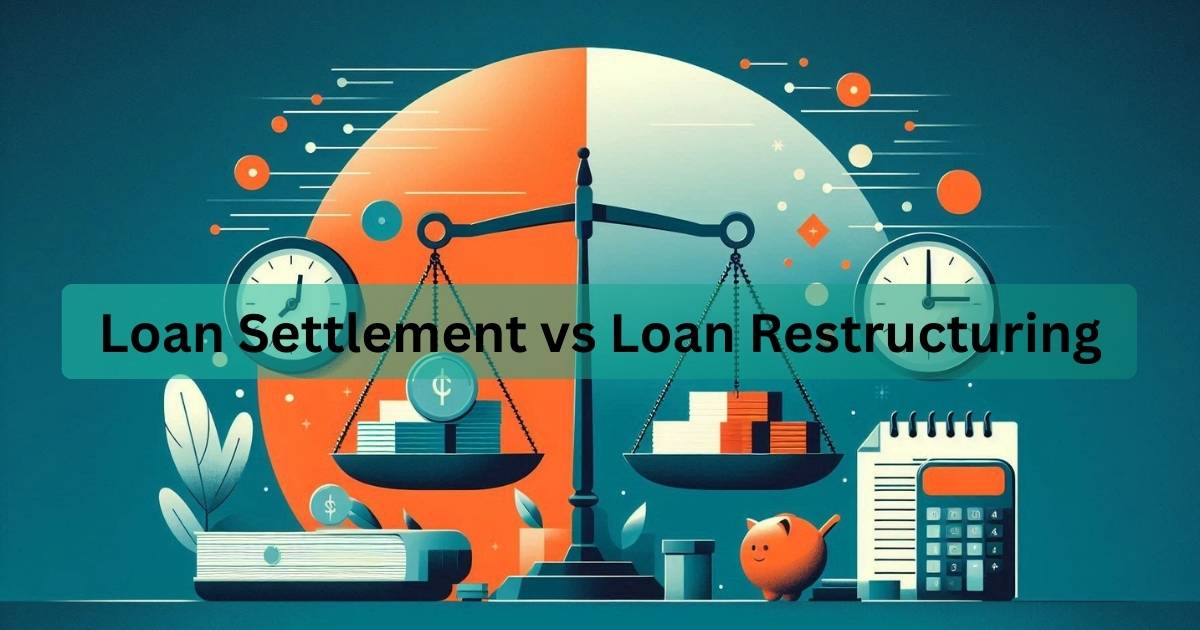· Loan Settlement · 4 min read
Loan Settlement vs Loan Restructuring: Which One Is For You?
Confused between loan settlement and loan restructuring? Learn the difference, RBI rules, CIBIL impact, and which option works best for debt relief in India.

When debt starts piling up, it feels like you are drowning with no way out. Rising EMIs, recovery calls, and the fear of a poor CIBIL score often push borrowers to look for alternatives. Two of the most common solutions are loan settlement and loan restructuring. While both can provide relief, they work in very different ways — and the choice you make will directly impact your financial future.
What Is Loan Settlement?
A loan settlement happens when the bank agrees to accept a one-time payment that is lower than the outstanding dues. This option is usually offered to borrowers facing severe hardship, such as:
Job loss or reduced income.
Medical emergencies or family crises.
Business collapses with no chance of recovery.
The Reserve Bank of India (RBI) allows banks to settle loans in such cases. You can explore RBI’s framework for stressed assets directly on the official RBI site.
However, there’s a catch: once your loan is marked as “settled” in the CIBIL report, your credit score will drop significantly. This makes it harder to get fresh loans for the next few years.
What Is Loan Restructuring?
In loan restructuring, instead of reducing the total outstanding, the bank changes the terms of repayment. This could mean a longer repayment tenure, reduced EMIs spread over more months, or even a temporary moratorium on payments.
The advantage is that the account remains “standard” and not “settled,” so your CIBIL score does not take a major hit. In fact, RBI encourages restructuring before settlement. Borrowers can check more about restructuring norms on the RBI website.
Loan Settlement vs Loan Restructuring: The Key Differences
The main difference lies in how each affects your financial record and credit score. With a loan settlement, you pay less than what you owe, but your credit report clearly reflects the word “settled.” This makes future borrowing difficult, as banks see it as a red flag.
On the other hand, loan restructuring keeps the loan active but on easier terms, so your repayment track record remains intact. Restructuring is usually seen as the safer, RBI-preferred option, while settlement is a last resort when repayment is impossible.
Which Option Should You Choose?
If you have absolutely no way of repaying, even with smaller EMIs, then loan settlement may be your only choice. But if you still have some repayment capacity and only need breathing space, loan restructuring is the better option since it saves your CIBIL score.
Borrowers often get confused between the two. Reading practical guides like this loan settlement vs restructuring comparison can help you decide with clarity.
Legal Protection for Borrowers
If you face harassment from recovery agents during this process, you can complain to the National Consumer Helpline. For disputes over recovery or repayment, borrowers also have the option to approach the Debt Recovery Tribunal. And in extreme financial stress, the Insolvency and Bankruptcy Board of India provides structured frameworks for debt relief.
Conclusion
Both loan settlement and loan restructuring are valid RBI-backed options, but they serve different borrower needs. Settlement gives immediate relief but damages your CIBIL score. Restructuring preserves your credit health but requires continued repayment discipline.
However, apart from settlement and restructuring, many borrowers also benefit from tailored approaches. You can read more about why a customised loan settlement plan matters in this detailed guide.
The safest move is to assess your repayment ability honestly, consult your bank, and rely on trusted resources like the RBI website and borrower forums. A wrong decision can set you back years, but the right one can restore your financial freedom much sooner.
Read the full article here: https://www.businesstoday.in/impact-feature/story/expert-panel-emerges-as-indias-largest-debt-resolution-platform-protecting-consumers-against-recovery-harassment-484033-2025-07-10
FAQs
Q1. Which is better: loan settlement or loan restructuring?
Restructuring is usually better if you still have repayment capacity, since it saves your CIBIL score.
Q2. Does RBI allow loan settlement?
Yes, RBI permits settlements in genuine hardship cases. Read official circulars on the RBI website.
Q3. Will loan settlement ruin my credit score?
Yes, your report will show “settled,” lowering your CIBIL score and affecting fresh loans.
Q4. Can restructuring apply to credit card debt?
Yes, banks may restructure personal loans and credit cards depending on your repayment ability.
Q5. Where can I file a complaint if recovery agents harass me?
You can approach the National Consumer Helpline or file a case in the Debt Recovery Tribunal.


 (1).BBangNKS.jpg)
